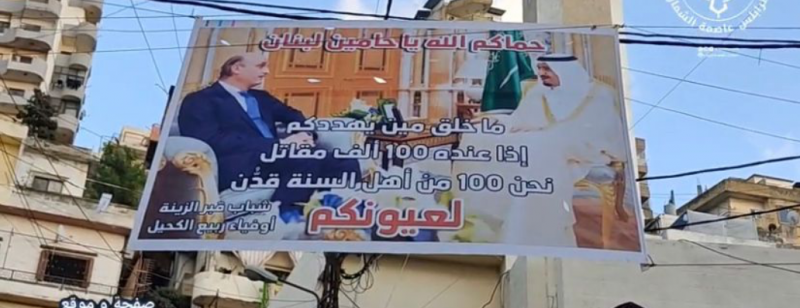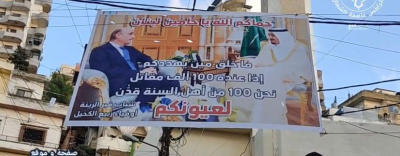
A poster in Tripoli depicting Samir Geagea received by King Salman of Saudi Arabia. (Credit: L’Orient-Le Jour)
“Someone has finally had the courage to teach Hezbollah a lesson!”
Khalil* was overjoyed on Friday evening, barely 24 hours after clashes erupted in Beirut’s Tayyouneh neighborhoods between members of Hezbollah and its ally the Amal Movement, and armed men allegedly affiliated with the Lebanese Forces. (The LF has denied involvement.)
Khalil, who is in his 30s, hails from Tariq al-Jadideh, a Sunni neighborhood of the capital that has long been considered a stronghold of former Prime Minister Saad Hariri’s Future Movement. He describes LF leader Samir Geagea as being “a man, a real one, who knew how to protect his community from thugs and bandits — unlike Hariri, who fell into the arms of Hezbollah and its allies.”
Geagea’s support among Khalil and those like him is quite ironic. The Christian leader, a bête noire of the Muslim community during the Civil War, is now praised by a segment of the Sunnis who regard him as the only force capable of standing up to Hezbollah.
“Today, while Saad Hariri’s leadership is highly disputed, Geagea is seen favorably by the Sunnis, who hold a grudge against Hezbollah,” says Jean Feghali, LBCI’s news director, without providing any figures. According to Feghali, polls carried out among predominantly Sunni constituencies show substantial support for the LF leader; however, L’Orient-Le Jour was unable to corroborate Feghali’s claim.
Since 2014, Hariri has developed a modus vivendi with Hezbollah, which he has never broken, although his relations with the Free Patriotic Movement, an ally of the Shiite party, have worsened.
Hariri has been rebuked by a segment of the Sunnis for failing to combat Hassan Nasrallah’s party, despite heightened tensions between Sunnis and Shiites in recent years.
The Oct. 14 clashes echoed the events of May 7, 2008, when fighters from Hezbollah and its allies stormed West Beirut neighborhoods following a decision by Fouad Siniora’s government to dismantle the Shiite movement’s parallel telecommunications network. The incident traumatized the Sunni community in particular, as it perceived its leadership as failing to defend Beirut’s neighborhoods against the Shiite militia.
“The Christians did not let it happen! The courage of their leader prevented Hezbollah’s thugs from vandalizing their shops and their houses as [Hezbollah] did on May 7,” says Omar, a merchant in Tariq al-Jadideh. In an apparent attempt to draw a comparison between the two events to his advantage, Geagea described the Oct. 14 events as a Christian “mini-May 7.”
Riyadh’s support
The LF leader clearly aims to lead the opposition to Hezbollah and push the Sunnis to join him.
Sunni former Justice Minister Achraf Rifi, viewed as a hawk in his camp, rushed to Maarab following the Tayyouneh fighting to express “solidarity with the LF.”
“Samir Geagea repelled Hezbollah, who wanted to take the whole republic hostage,” he told L’Orient-Le Jour. Rifi claims to have obtained information “that the LF has faced a serious danger of being dissolved.”
Hezbollah reportedly considered resorting to the court of justice to demand the dissolution of Geagea’s party, before later ruling out this option.
Rifi also admits to wanting to build an electoral alliance with the LF leader. “Sovereignist groups are more aware than ever that we cannot afford to lose more time. We are currently working on building a front with the LF, and also with the National Liberal Party led by [former President] Camille Chamoun and Fares Soueid, who heads the Gathering of Saydet el-Jabal, and even Shiite figures opposing Hezbollah,” he says.
Will Geagea be able to make a breakthrough in Sunni areas in the next legislative elections, scheduled for March 27?
“One shouldn’t expect to see LF candidates running in [the Muslim-majority] Beirut II District, but one can expect Geagea to have a say in nominating the Christian candidate for this constituency,” Feghali says.
The Christian leader has another big advantage on his side: the support of Saudi Arabia, long regarded as the patron of the Sunni community in Lebanon. Riyadh is probably considering supporting the LF’s breakthrough in Sunni quarters, which may explain posters hung in Tripoli following the Tayyouneh clashes that showed the LF leader seated alongside the Saudi ruler.
“Samir Geagea himself told me that he was receiving money from Riyadh and offered to finance my campaign if, in return, I ran as an independent,” a Tripoli MP affiliated with the Future Movement says. Saad Hariri’s party, in fact, finds itself in an extremely delicate position with Samir Geagea’s rise in the Sunni community.
The three-time former prime minister is still persona non grata in Riyadh’s eyes, and his popularity among the Sunnis seems to have declined. Relations between the LF and the Future Movement have also been rocky for months, after Geagea did not support Hariri’s designation as premier and recently refused to join any cabinet led by him, denying his former ally a major advantage in his standoff with the president’s son-in-law, Gebran Bassil.
A mistake
The Sunni leadership is particularly embarrassed after the Tayyouneh incident, after it has repeatedly denounced the decisions by judges Fadi Sawwan and Tarek Bitar in the 2020 Beirut port explosion investigation.
It opposed the prosecution of former Prime Minister Hassan Diab and supported former Minister Nohad Machnouk’s lawsuit to remove the judge from his post. Rifi says this is a mistake, as “Dar al-Fatwa must not turn into a platform campaigning against justice.”
“Hezbollah tried to mobilize the Sunnis against Judge Bitar on the pretext of defending the prestige of the post of prime minister. Where was Hezbollah’s dedication to the status of the Serail’s head when it blew up his car in 2005?” he asks, referring to the assassination of former Prime Minister Rafik Hariri.
The Special Tribunal for Lebanon convicted only one Hezbollah member of having a central role in the bombing that killed Hariri, acquitting three others as well as Hezbollah’s leadership due to insufficient evidence. Appeals of acquittals in the case are pending.
Does this setup make Geagea the main rival of Hariri in the next elections? It is probably too early to tell, because while Geagea seems more and more popular among the Sunnis, he does not have unanimous support.
“On Oct. 14, I realized that we, the Sunnis, are the only ones who respect the state and are not armed to the teeth. We want to smooth relations with everyone to maintain peace, and we renounce violence,” says Rawad,* a medical student living in Beirut’s Ras al-Nabeh area and a staunch Hariri supporter.
“I do not understand these Tripolitans who hang pictures of Geagea in their city. Remember Rachid Karami [the former prime minister whom Geagea and 10 other LF members were convicted of assassinating], and all the crimes that Geagea committed.”
*Names have been changed.
This article was originally published in French in L’Orient-Le Jour. Translation by Joelle El Khoury.
Khalil* was overjoyed on Friday evening, barely 24 hours after clashes erupted in Beirut’s Tayyouneh neighborhoods between members of Hezbollah and its ally the Amal Movement, and armed men allegedly affiliated with the Lebanese Forces. (The LF has denied involvement.)
Khalil, who is in his 30s, hails from Tariq...
